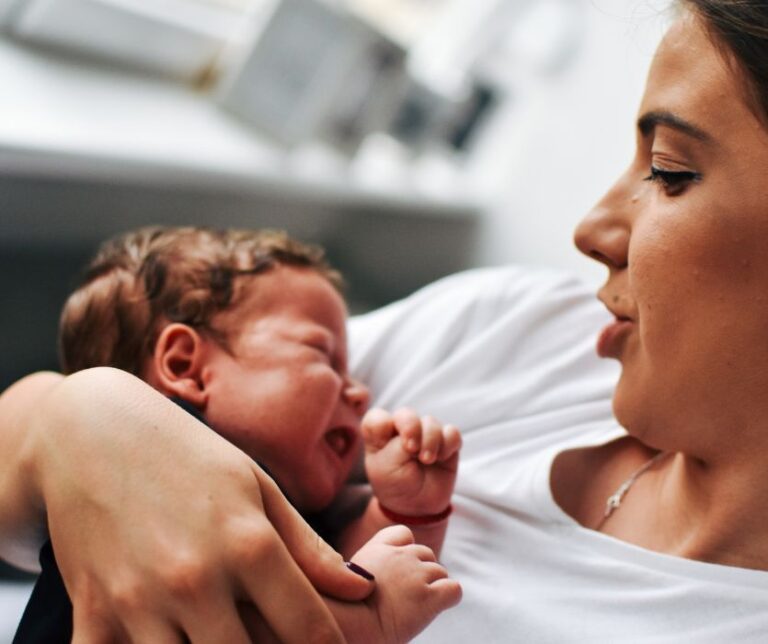
[ad_1]
When I first became a mother, I also became an amateur statistician and scientist. I recorded percentiles and observed milestones. I had apps for tracking daily activities and this new thing called a leap that magically explained every terrible night of sleep. It was in no way lost on me that my child was going through an intense and profound development period.
My role, as their mother, was to nurture this development and support my child in reaching their potential. As my child transitions from infant to baby, toddler, preschooler and on and on into adulthood – I have accepted this development period will essentially be an ongoing process requiring evolving support.
Let’s contrast that to being a mother.
You’re handed your baby and BAM – instant transformation. Some mysterious combination of instincts and hormones suddenly bestows you with all the knowledge and skills needed to be a mother. That’s it. There is just ‘before you were a mother’ and ‘mother’.
It doesn’t matter if you’ve never changed a diaper, know nothing about breastfeeding or never held a baby before – somehow at that moment, when you look into your child’s eyes and fall deeply in love, you’ll just know.
And we all know this is a lie. A super dangerous one.
Early motherhood is better articulated as a steep learning curve and a wicked rollercoaster. If you can get an honest answer, I’d guess most mothers are more likely to use the word ‘disorienting’ than ‘blissful’ when describing the transition into motherhood.
If we start poking around at our feelings, under the depth of our tiredness, we may find love bordering on obsession mixed with a strange sense of grief. That’s not in the baby books.
Our village generally consists of online message boards to partake in lengthy threads on the many merits and pitfalls of 3-day potty training. Somehow the plethora of advice isn’t reassuring. We ping-pong from good mom to bad mom day to day, moment to moment with every perceived success and failure.
What if women were told the transition to becoming a mother would take years – and would, in fact, be an ongoing process as life unfolds with its inevitable changes?
I suspect most would be relieved because that description aligns much better with our experience, offering some reassurance that there isn’t something wrong with us.
There is a word for what I am describing: Matrescence
The definition comes from Aurélie Athan, Ph.D., a clinical psychologist at Columbia University:
“The process of becoming a mother, coined by Dana Raphael, Ph.D. (1973), is a developmental passage where a woman transitions through pre-conception, pregnancy and birth, surrogacy or adoption, to the postnatal period and beyond. The exact length of matrescence is individual, recurs with each child, and may arguably last a lifetime! The scope of the changes encompass multiple domains –bio-psycho-social-political-spiritual– and can be likened to the developmental push of adolescence.” – Aurélie Athan, Ph.D.
Why does matrescense matter?
Words are powerful – putting a name to this experience gives us the language we need to talk about it.
Recognizing the transition into motherhood as a developmental process means we can take steps to support it – both as individuals and as a culture. Approaching motherhood with support and compassion results in a better experience.
Matrescence matters because instead of saying, “I’m finding this hard – I must be a bad mom.”
We can say, “I’m finding this stage of motherhood a struggle – I wonder what support I’m in need of?”
Instead of being stuck in this good mom / bad mom binary, we can give ourselves permission to pause and reflect.
If you’ve ever wondered…
- When does this get easier?
- When will I feel like myself again?
- Why isn’t this more natural?
Matrescence gives us a safe space to explore these challenging questions.
It allows us to make sense of our journey, activate our inner knowing and step confidently into motherhood.
As the years pass, I read fewer and fewer articles. There are no more parenting apps on my phone. When faced with the latest milestone, I’m rarely tempted to crowdsource advice.
Part of this is the passage of time – some things do get easier. But it’s more than that. When I began devoting time and space to my own development in motherhood, something shifted. I stopped obsessing over ‘getting it right’ and began finding fulfillment in the journey itself.
Anxiety has been replaced by a blend of curiosity, excitement and so much compassion as I grow alongside my children.
Matrescence doesn’t just matter – it might just be the missing piece that puts it all together.
Our next reco: New Mom Guilt: Why You’re Not Failing as a Mother
[ad_2]